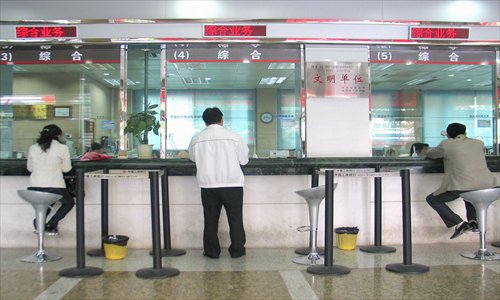Banks fined for arbitrary charges

Customers at a bank outlet in Quanzhou, East China's Fujian Province Photo: CFP
China's price regulator said Wednesday it had handed penalties totaling 825 million yuan ($135.69 million) to 64 commercial banks for making arbitrary charges.
The National Development and Reform Commission (NDRC) has standardized the fees charged by commercial banks and cut the number of charges by half since 2012, said Xu Kunlin, head of the commission's Price Supervision and Inspection and Antitrust Bureau.
The NDRC has slapped fines of 416 million yuan on the banks, and has required that 409 million yuan should be returned to people or companies who were charged inappropriately from September 2013 to the end of January.
Last September, the commission began a crackdown on arbitrary charging by banks, as part of an effort to improve financing for micro and small businesses, Xu said.
The NDRC investigated China's major national commercial banks, including Industrial and Commercial Bank of China and China Merchants Bank, as well as 26 city commercial banks and rural credit cooperatives, said Xu.
Li Daxiao, director of research at Yingda Securities Co, told the Global Times Wednesday that the NDRC's measures were timely, targeted and necessary, but were far from being sufficient.
The malpractices uncovered by the NDRC in the investigation are "just the tip of the iceberg," Li said.
Wang Mingfei, a banking industry analyst with Shanghai-based Oriental Securities, told the Global Times Wednesday that many commercial banks charge extra fees partly because the central bank still maintains a ceiling for the lending rate.
"When cash is tight, commercial banks need to earn more and they cannot make the extra profit through higher lending rates. This forces them into charging arbitrary fees," Wang said, adding that the problem could be tackled by removing the cap on the lending rate.
According to Xu, the phenomenon of arbitrary charging remains severe and prevalent despite the commission's efforts to curtail the problem, because the banks and authorities lack an effective long-term mechanism and solutions to deal with the issue.
Li said the fundamental way to fix the problem was breaking up the monopolistic positions of major commercial banks.
"The NDRC's crackdown, though effective in the short run, is not the ultimate solution," Li said. "The banking sector needs to be more open, and only fierce competition can stop the banks from charging unnecessary fees."
"We will continue the inspection," Xu said. "At the same time, we are drafting detailed regulations for the charges that commercial banks can make."
Li said the central bank may need to grant more commercial bank licenses, which would also require tighter regulations for new banks.
NDRC confirms US company investigations
The NDRC said Wednesday that it has been conducting antitrust investigations into US firms Qualcomm Inc and InterDigital Inc since the middle of last year.
The two US companies had already disclosed last year that the probe had been launched, but this was the first time that the regulator had confirmed it.
The NDRC did not disclose any details about the investigations, or whether it had reached any conclusions.
Qualcomm, a microchip maker, said in November that it was not aware of any of its activities that might have triggered the NDRC's anti-monopoly investigation.
The commission launched its probe into Qualcomm after industry associations and companies reported that the firm was abusing its dominant position in the market and conducting price discrimination, said Xu Kunlin, head of the NDRC's Price Supervision and Inspection and Antitrust Bureau.
The NDRC initiated its investigation into InterDigital, a wireless research and development company, after unnamed entities complained that the firm was charging unfairly high patent royalties for its technology.
The commission also said that it was assessing whether China Unicom and China Telecom have fulfilled their promises to increase integration of their networks, stop price discrimination against Internet service providers, raise broadband speeds, and lower prices.
Global Times